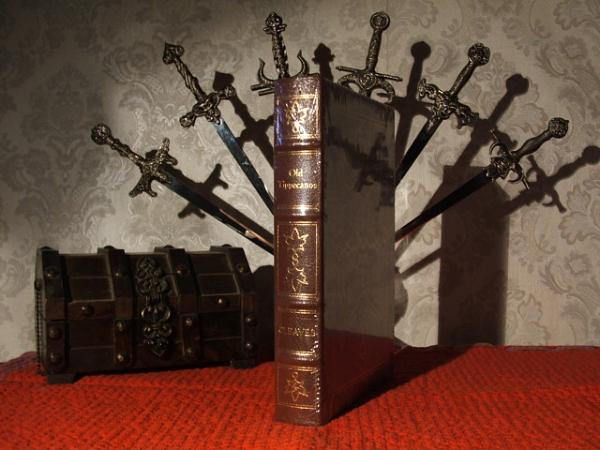Easton Press William Henry Harrison books
Old Tippecanoe, William Henry Harrison and His Time - Freeman Cleaves - 1986
President William Henry Harrison biography
William Henry Harrison (1773-1841), American soldier and statesman, ninth President of the United States, son of Benjamin Harrison, signer of the Declaration of Independence, and grandfather of President Benjamin Harrison, twenty-third President of the United States. William Harrison was born in Berkley, Charles City Co., Va., and attended Hampden-Sidney College in Va. and the College of Physicians and Surgeons in Philadelphia.
William Harrison served in the United States Army form 191 to 1798, when President John Adams appointed him secretary of the North-west Territory. He became the delegate in Congress of the Territory in 1799, and was the first Territorial delegate ever to sit in Congress; in the following year he was appointed governor of the then newly created territory of Indiana. President Thomas Jefferson and President James Madison subsequently reappointed him and he served until 1812; his tenure of office was marked by conciliatory policies toward the Indians, with whom he negotiated about thirteen treaties providing land for their use. When hostilities with the Indians led by the Shawnee Chief Tecumseh broke out in 1811, William Harrison won a decisive victory at the battle of Tippecanoe.
During the War of 1812 William Harrison was in command of the American forces of the Northwest and was promoted to the rank of major general. In September, 1813, he won a signal victory over the British forces and their Indian allies in the battle of the Thames in Canada.
After the war William Henry Harrison was a representative of Ohio in the United States House of Representatives from 1816 to 1819 and in the United States Senate from 1825 to 1828; in the next year he served as the first United States minister to Colombia. Thereafter he lived in retirement but emerged in 1835 to become the presidential nominee for the Whigs. He was defeated in the election but was re-nominated in 1839; John Tyler of Virginia was his running mate. The election campaign of that year was made notable by the innovation of political mass meetings and processions, theretofore unknown in Presidential elections. William Harrison's simple life, his associations with the democratic life of a frontiersmen, and his military exploits were emphasized during the campaign in a number of effective slogans, among which "Tippecanoe and Tyler too" was the most popular. President William Harrison won an overwhelming victory. Thirty-one days after his Inauguration as ninth President of the United States he died of pneumonia; he was the first President to die in office.
Old Tippecanoe
Old Tippecanoe: William Henry Harrison and His Time is a captivating biography authored by Freeman Cleaves, offering readers a comprehensive exploration of the life and legacy of the ninth President of the United States. Cleaves delves into the complexities of Harrison's character, his military career, and his brief yet consequential presidency. Born on February 9, 1773, in Charles City County, Virginia, William Henry Harrison emerged as a prominent figure in American politics and military history during the early 19th century. Cleaves paints a vivid portrait of Harrison's early years, including his upbringing in a prominent Virginia family and his experiences as a young officer in the United States Army.
Harrison's military career was marked by his leadership in the Northwest Territory and his role in the War of 1812. He gained renown for his victory at the Battle of Tippecanoe against Native American forces led by Tecumseh, earning him the nickname "Old Tippecanoe" and propelling him to national prominence. Cleaves's biography delves into Harrison's political career, including his service as the first territorial delegate from Indiana and his tenure as Governor of the Indiana Territory. Harrison's advocacy for westward expansion and his efforts to secure Native American lands for white settlement were central themes of his political agenda.
In 1840, Harrison was elected as the ninth President of the United States, serving only 31 days before succumbing to pneumonia, making his presidency the shortest in American history. Despite its brevity, Harrison's presidency was marked by several significant achievements, including his commitment to fiscal responsibility and his efforts to expand the nation's borders.
Through meticulous research and engaging prose, Cleaves offers readers a nuanced understanding of Harrison's life and times. "Old Tippecanoe: William Henry Harrison and His Time" is an essential read for anyone interested in the history of the United States and the individuals who shaped its destiny during this critical period of the nation's development.
William Henry Harrison quotes
"There is nothing more corrupting, nothing more destructive of the noblest and finest feelings of our nature, than the exercise of unlimited power."
"The only legitimate right to govern is an express grant of power from the governed."
"There is no part of the means placed in the hands of the Executive which might be used with greater effect for unhallowed purposes than the control of the public press."
"I contend that the strongest of all governments is that which is most free."
"No man could have been placed in a more difficult situation than myself."
"I am one of those who do not believe that a national debt is a national blessing, but rather a curse to a republic."
"Sir, I wish you to understand the true principles of the government. I wish them carried out. I ask nothing more."
"A decent and manly examination of the acts of the Government should be not only tolerated, but encouraged."

Comments
Post a Comment
Share your best book review and recommendation